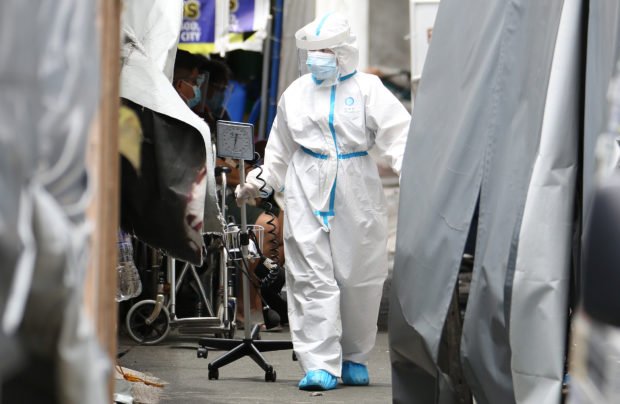
INQUIRER FILE PHOTO
CEBU CITY, Philippines – The Commission on Audit (COA) has directed the Cebu City Government to stop granting financial incentives to personnel who are not directly attending to COVID-19 patients.
State auditors discovered that the city spent around P10.9 million for COVID-19 Special Risk Allowance (SRAs) in 2020 but nearly half of the amount was given to non-Public Health Workers.
“The audit revealed that the City granted SRAs totaling ₱5,137,726.07 to various personnel who cannot be classified as PHWs,” portions of COA’s 2021 Annual Audit Report for Cebu City stated.
COA pointed out that local government units (LGUs) and national government agencies should comply with Joint Circular No. 2 of the Department of Budget and Management (DBM) and the Department of Health (DOH) when distributing SRAs during the pandemic.
In it, government officials are mandated to provide COVID-19 SRAs to “medical, allied-medical, and other personnel who directly provide treatment and support care to COVID-19 patients.”
Each qualified beneficiary can get up to P5,000 per month.
“We recommended that Management (Cebu City Government) stop the grant of SRAs to the non-medical and non-allied employees and adhere to the guidelines set forth under DBM-DOH Joint Circular No. 2, s. 2020,” COA said.
Reply
City Hall executives, in response to COA’s query, tried to justify that non-PHWs who received the SRAs were constantly exposed to threats of the virus due to their assignments.
“In their justification letter addressed to the Office of the City Accountant, the Acting Chief of Hospital reasoned out that the immediate environment where the employees’ offices are situated inside the compound, whether near or next to the restricted (red zone) areas, contain a high viral load. Every working day, employees passed those areas to and from work,” said COA, quoting the city government.
The non-PHWs were assigned to Cebu City Medical Center, Guba Community Hospital, and Cebu City Quarantine Center, all of which served as isolation centers for confirmed COVID-19 patients with mild symptoms during the height of the pandemic.
Joint Circular
However, COA pointed out that the city’s justifications still ran contrary to the provisions found on the Joint Circular of DBM and DOH.
“The Circular is not sweeping but specific on the conditions on the grant for it did not simply state that all personnel assigned in hospitals and healthcare facilities are qualified for the grant of SRA by the mere fact of their place of assignment,” said COA.
“Hence, contrary to the application by the City of the Circular, not all personnel assigned in the hospitals and healthcare facilities are automatically entitled with COVID-19 SRA,” they added.
The state auditing body also reminded the city government to ensure distribution of public funds shall be made by employees duly authorized as disbursing officers.
COA found out that the SRAs were disbursed through personnel not appointed or designated as the city’s collecting or disbursing officers.
“Although each check disbursement was supported with a signed payroll register signifying the receipt of allowances by the recipients, the practice of releasing checks to employees who were not designated as disbursing officers exposed funds to unmitigated risk of loss in case of infidelity of the personnel in the handling of funds which is the very essence why the law requires every accountable officer to be properly bonded,” they explained.
RELATED STORIES
COA: Cebu City bought P91M sacks of rice from ‘middleman’
COA questions Talisay City’s purchase of ‘high-end PCs, laptops’
DBM releases P1.08 billion for health workers hit by COVID
300 Mandaue healthcare workers may receive One COVID-19 allowance
/dcb